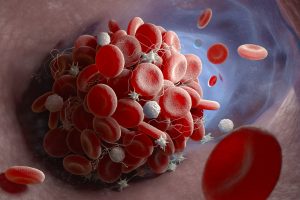Heart attacks are often sudden and painful and can lead to further complications or death. In this article we will examine heart attack causes and risk factors, heart attack symptoms, and what you can do to lower your risk.
Heart Attack Causes

It all begins with buildup. Substances like cholesterol cause plaque buildups in the arteries. Observation has shown us that it isn’t just the plaque buildup itself that is causing heart attacks. It is the blood clots that build on top of the plaques and then rupture, causing a blockage. This cuts off blood flow to the heart. You can have a full or partial clot and have a heart attack.
Another cause is a spasm of the coronary artery. Like the blood clot, this cuts off the blood flow to the heart. These are usually caused by using tobacco and illicit drugs such as cocaine.
These are the direct heart attack causes—but what about the factors that lead up to the plaque buildups, blood clots, and spasms? The following are risk factors you might want to think about as you consider your heart health.
Risk Factors
Age. As we age, our artery walls thicken and harden. This increases blood pressure and the risk of heart attack. Men over 45 and women over 55 have an increased risk of heart attack. Post-menopausal women have an increased risk of heart attack because estrogen is thought to protect against heart attacks.
Family history. Family history of heart attack will likely increase your risk of heart attack. Take time to understand your medical family history.
Smoking tobacco increases blood pressure and causes plaque buildup. This is also true for those exposed to second-hand smoke.

Include healthy cholesterol in your diet
High blood pressure. Blood pressure is the force of your blood that beats against artery walls. High blood pressure causes more damage to your arteries over time. It is also associated with other conditions like obesity, high cholesterol, and diabetes.
High cholesterol. There are different types of cholesterol. One is low-density lipoprotein (LDL) or “bad” cholesterol that will narrow you arteries. Then there is high-density lipoprotein (HDL) or “good” cholesterol that actually lowers your risk of heart attack. Be sure to avoid foods with trans fat (processed and deep fried foods) and consume foods with good fats (such as nuts, seeds, avocados, and vegetable oils).
High triglyceride levels. Triglycerides are a type of blood fat you get from your diet. Similar to LDL cholesterol, high levels of triglycerides will also buildup in your arteries and increase your risk of heart attack.
Obesity. Being overweight can add extra pressure on your heart, which beats more frequently. It is also a sign of other risk factors such as high cholesterol, high triglyceride levels, and diabetes. But even losing 10% of your body weight will lower your risk of heart attacks.
Diabetes. When your pancreas does not produce enough of a hormone called insulin, this causes your blood sugar levels to rise. These high glucose levels in your blood eventually cause damage to your blood vessels and nerves. Gestational diabetes is an onset of high blood sugar during pregnancy, which increases the risk of developing type 2 diabetes and is linked with an increased risk of heart attack.
Metabolic syndrome. This is a combination of obesity, high blood pressure, and high blood sugar levels. You are twice as likely to develop heart disease if you have metabolic syndrome.
Sedentary lifestyle. Not consistently engaging in physical activity (30 minutes per day) contributes to high cholesterol, obesity, and high blood pressure. Exercise lowers the blood pressure and keeps the heart healthy and strong.
Stress. Consistent stress can cause the blood pressure to rise and increase levels of hormones like adrenaline and cortisol. Stress can also cause other risk factors to become worse. People might be more likely to overeat, smoke, or do less physical activity. Unmanaged, stress can contribute to your risk of heart attack.
Illicit drug use. Stimulant drugs can trigger a spasm of the coronary arteries, which can cause a heart attack. These include drugs such as amphetamines or cocaine.
Preeclampsia. This is high blood pressure during pregnancy, which can increase the risk of heart attack later in life.
Autoimmune conditions. Conditions like lupus, psoriasis, or rheumatoid arthritis can increase a person’s risk of heart attack. This is possibly because of the way the autoimmune disease causes the blood vessels to harden and traps cholesterol within its walls.
Signs and Symptoms
Look for the following signs and symptoms to know if you could be having a heart attack:
- Pressure, tightness, pain, aching or squeezing sensation in chest or arms
- Similar sensations in neck, jaw, or back
- Shortness of breath
- Cold sweat
- Nausea, indigestion, heartburn, or abdominal pain
- Fatigue
- Lightheadedness or dizziness
ALWAYS seek emergency medical help if you are experiencing one or more of the above symptoms and think you might be having a heart attack.
Complications
Having a heart attack can lead to the following complications:
- Arrhythmias. These are irregular heart rhythms that are caused by interruptions in heart’s electrical system.
- Heart failure is when your body does not pump the amount of blood your body needs.
- Sudden cardiac arrest. Arrhythmia can lead to the heart stopping without warning. The risk of sudden cardiac arrest is increased after a heart attack.
Prevention
 The good news is, you can lower your risk of having a heart attack. These suggestions are centered around maintaining a healthy lifestyle and take effort and time. But the effects are worth it.
The good news is, you can lower your risk of having a heart attack. These suggestions are centered around maintaining a healthy lifestyle and take effort and time. But the effects are worth it.
- Get to know your family history. Understanding your increased risk of heart disease and heart attacks will help you be more vigilant about risk factors and symptoms.
- Eat a healthy diet. Avoid foods with LDL cholesterol (like deep fried foods and packaged baked goods) and include foods with HDL cholesterol (nuts, avocados, and vegetable and olive oils). Include plenty of fruits, vegetables, and whole grains.
- Change unhealthy lifestyle behaviors. Examples include quitting smoking, heavy drinking, or illicit drug use.
- Stay physically active. Just 30 minutes a day to get your blood pumping will lower your blood pressure and reduce your risk of heart attack.
- Manage your stress and feelings such as anger and hostility. You can use methods such as meditation and deep breathing to handle these emotions.
- Have regular visits with your doctor to check your blood pressure and general heart health. Checking your blood pressure is also something you can learn to do at home with the proper equipment.
- Talk with doctor about taking daily aspirin or other medications for your heart health.
Do what you need to do to lower your risk of heart attack. Understand the risk factors and make a plan with your doctor to maintain a healthy lifestyle.
Resources:
- https://www.mayoclinic.org/diseases-conditions/heart-disease/symptoms-causes/syc-20353118
- https://www.webmd.com/heart-disease/heart-attack-causes-treatments#1
- https://www.cardiosmart.org/News-and-Events/2017/10/Gestational-Diabetes-Increases-Womens-Risk-for-Heart-Attack-and-Stroke
- https://www.nhlbi.nih.gov/health-topics/smoking-and-your-heart
- https://www.niddk.nih.gov/health-information/diabetes/overview/preventing-problems/heart-disease-stroke
- https://www.medicinenet.com/stress_and_heart_disease/article.htm#what_causes_stress
- https://www.sciencedaily.com/releases/2018/11/181108130543.htm


